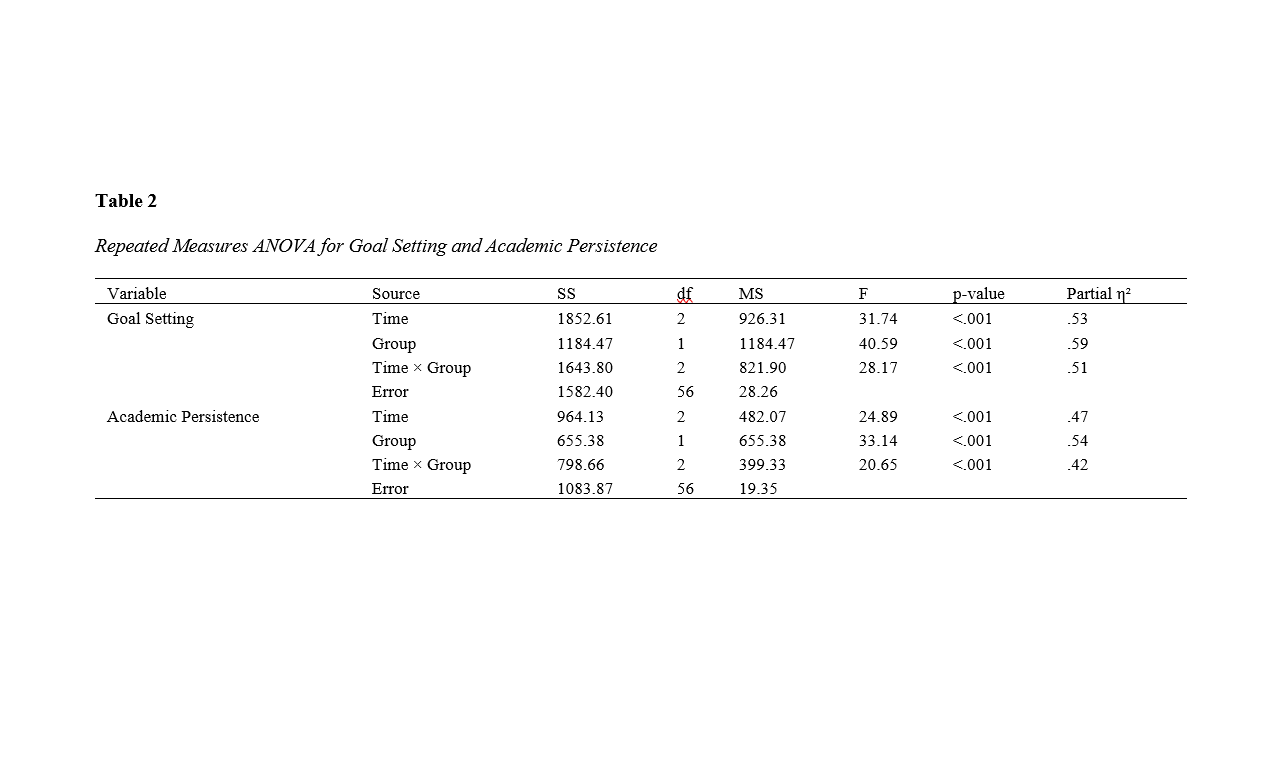The Impact of Self-Efficacy Training on Goal Setting and Academic Persistence
Keywords:
Self-efficacy training, goal setting, academic persistence, high school students, randomized controlled trial, psychological interventionAbstract
Objective: The objective of this study was to evaluate the effectiveness of self-efficacy training on enhancing goal setting and academic persistence among high school students.
Methods and Materials: This research employed a randomized controlled trial design with two groups: an experimental group receiving self-efficacy training and a control group with no intervention. Thirty students from Bulgaria were randomly assigned to each group (n = 15). The intervention consisted of twelve structured sessions (45–60 minutes each), designed based on Bandura’s self-efficacy theory and focused on goal setting, self-belief, emotional regulation, and academic strategies. Participants completed validated scales measuring goal setting and academic persistence at pre-test, post-test, and five-month follow-up stages. Data were analyzed using repeated measures ANOVA and Bonferroni post-hoc tests with SPSS-27.
Findings: The results indicated significant improvements in both goal setting and academic persistence in the experimental group over time compared to the control group. Descriptive statistics revealed that the experimental group’s mean score for goal setting increased from 45.73 (SD = 5.19) at pre-test to 58.60 (SD = 4.77) at post-test and remained high at follow-up (M = 57.80, SD = 5.12). Academic persistence scores followed a similar pattern, increasing from 34.87 (SD = 4.11) to 42.27 (SD = 3.65) and slightly decreasing to 41.40 (SD = 3.84). Repeated measures ANOVA showed significant main effects for time and group, and a significant interaction effect (p < .001). Bonferroni tests confirmed significant improvements from pre-test to post-test and follow-up (p < .001), with no significant decline between post-test and follow-up.
Conclusion: The self-efficacy training program effectively enhanced students’ goal-setting abilities and academic persistence, with lasting effects observed after five months. These results support the integration of psychological skills training into school curricula to promote student motivation and resilience.
Downloads
References
Al-Bataineh, A., Brenwall, L., Stalter, K., & York, J. (2019). Student Growth Through Goal Setting. International Journal of Learning and Teaching, 11(4), 147-161. https://doi.org/10.18844/ijlt.v11i4.4329
Basith, A., Syahputra, A., & Ichwanto, M. A. (2020). Academic Self-Efficacy as Predictor of Academic Achievement. Jpi (Jurnal Pendidikan Indonesia), 9(1), 163. https://doi.org/10.23887/jpi-undiksha.v9i1.24403
Brinkman, C., Baez, S., Genoese, F., & Hoch, J. M. (2020). Use of Goal Setting to Enhance Self-Efficacy After Sports-Related Injury: A Critically Appraised Topic. Journal of Sport Rehabilitation, 29(4), 498-502. https://doi.org/10.1123/jsr.2019-0032
Chung, H. Q., Chen, V., & Olson, C. B. (2021). The Impact of Self-Assessment, Planning and Goal Setting, and Reflection Before and After Revision on Student Self-Efficacy and Writing Performance. Reading and Writing, 34(7), 1885-1913. https://doi.org/10.1007/s11145-021-10186-x
Dattathreya, P. (2022). Developing Student Self-Efficacy Through Academic Coaching. 203-221. https://doi.org/10.4018/978-1-6684-5039-0.ch010
Dierikx, M. L. J., Albers, N., Scheltinga, B. L., & Brinkman, W. P. (2024). Collaboratively Setting Daily Step Goals With a Virtual Coach: Using Reinforcement Learning To Personalize Initial Proposals. 100-115. https://doi.org/10.1007/978-3-031-58226-4_9
Dong, T., Tao, Y.-T., & Zhang, S.-l. (2020). Research on the Relations Among Achievement Goal Setting, Self-Efficacy and English Learning Achievement of Engineering Graduate Students: A Structural Equation Modeling Approach. Scholars International Journal of Linguistics and Literature, 3(7), 216-223. https://doi.org/10.36348/sijll.2020.v03i07.002
Du, B., Sheng, X., Ye, Q., & Lai, Y. (2024). The Impact of College Students' Career Decision Self-Efficacy on Career Adaptation From the Perspective of High-Quality Employment: The Mediating Role of Career Preparation Behavior. World Journal of Education and Humanities, 6(3), p1. https://doi.org/10.22158/wjeh.v6n3p1
Gobbi, P. (2022). Self-Efficacy, Goal Setting and Intention for Going to Sleep. https://doi.org/10.17605/osf.io/hxbsg
Heikkinen, S., Cristea, T., Saqr, M., Malmberg, J., Kleingeld, A., Snijders, C., Matzat, U., & Tedre, M. (2024). Sequence Analysis and Process Mining Perspectives to Goal Setting: What Distinguishes Business Students With High and Low Self-Efficacy Beliefs? Smart Learning Environments, 11(1). https://doi.org/10.1186/s40561-024-00327-4
Hoffmann, A. (2023). The Impact of Gamification on Self-Efficacy in Managers. Jaes, 18(16), 27. https://doi.org/10.57017/jaes.v18.1(79).04
Li, Q. (2024). How Does Geographical Context Affect the Development of Youth Self-Efficacy. Journal of Psychology & Behavior Research, 6(2), p98. https://doi.org/10.22158/jpbr.v6n2p98
Lokahitta, W. D., & Affandi, G. R. (2023). Application of Goal Setting to Increase Self Efficacy in Vocational Students: A Non Randomized Control Trial Approach. Guidena Jurnal Ilmu Pendidikan Psikologi Bimbingan Dan Konseling, 13(2), 428. https://doi.org/10.24127/gdn.v13i2.7393
Macklem, G. L. (2020). Self-Efficacy and Goal Setting. 201-219. https://doi.org/10.1007/978-3-030-65695-9_10
Mihalca, L., Rațiu, L., Mengelkamp, C., Brendea, G., & Metz, D. (2024). The Role of self‐regulatory Abilities in Predicting Performance While Teleworking: A cross‐sectional and a Panel Study During the COVID‐19 Pandemic. Human Resource Development Quarterly, 35(4), 477-500. https://doi.org/10.1002/hrdq.21523
Oldham, H. (2018). Mathematics Self-Efficacy in High School Students and the Effects of Interim Goal Setting: How Goals and Efficacy Are Linked in the Self-Efficacy Goal Spectrum. https://doi.org/10.57709/12039255
Rożnowski, B., & Kot, P. (2020). The Importance of the Phase of Preparation for the Transition and the Effectiveness of Youth Entering the Labor Market. Educational Psychology, 60(18), 44-58. https://doi.org/10.5604/01.3001.0014.6222
Saks, K. (2024). The Effect of Self-Efficacy and Self-Set Grade Goals on Academic Outcomes. Frontiers in psychology, 15. https://doi.org/10.3389/fpsyg.2024.1324007
Sutrisno, T., & Arsanti, T. A. (2023). Pengaruh Goal Setting Dan Self-Efficacy Terhadap Kinerja Karyawan. Inobis Jurnal Inovasi Bisnis Dan Manajemen Indonesia, 7(1), 96-105. https://doi.org/10.31842/jurnalinobis.v7i1.306
Taylor, S., Martin, J., Wilson, O. W. A., Elliot, L., & Bopp, M. (2024). The Impact of Physical Activity Enjoyment, Exercise Self-Efficacy, Recording Physical Activity, and Exercise Goal Setting on Physical Activity Levels of College Students. Recreational Sports Journal, 49(1), 33-45. https://doi.org/10.1177/15588661241261997
Ye, J. (2021). The Relationship of Academic Self-Efficacy, Goal Orientation, and Personal Goal Setting Among High School Students. Frontiers in Educational Research, 4(11). https://doi.org/10.25236/fer.2021.041109
YentÜR, M. M. (2023). The Effect of Geography Teachers’ Self-Efficacy Perceptions and Attitudes Toward Teaching on Their Motivation. International Journal of Educational Research Review, 8(2), 360-367. https://doi.org/10.24331/ijere.1255100
Zam, R. M., Ahmad, S. A., Ismail, A. M., & Ismail, A. H. (2024). The Impact of Self-Efficacy on Performance Management in Malaysia's Public Sector. Information Management and Business Review, 16(3(I)), 536-549. https://doi.org/10.22610/imbr.v16i3(i).3906

Downloads
Additional Files
Published
Submitted
Revised
Accepted
Issue
Section
License

This work is licensed under a Creative Commons Attribution-NonCommercial 4.0 International License.








